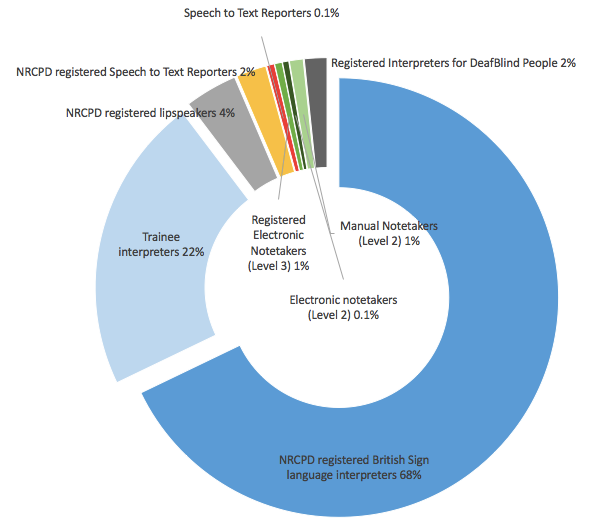Where’s the communication support for the 99%?

This week the DWP launched its market review of British Sign Language and communications provision for people who are deaf or who have hearing loss and invited responses.
It’s not a long document, so please take a few minutes to read it. For me three key issues demanded attention:
Not everyone with hearing loss knows BSL!
The use of “British Sign Language and communications provision” rather than simply “communications provision” reflects a frequent belief that BSL is the default method of communication support for anyone with hearing loss. And it’s not just the DWP. People with all levels of hearing loss who need communication support to access a service from organisations – whether public sector or private – often find the only option available is BSL, even if they request a different format.
Research from the charity Action on Hearing Loss shows that there are now 11 million people in the UK with hearing loss 1. Out of that 11 million just 24,000 [2] use sign language as their main language – that is, need a BSL interpreter. AoHL recognise that this may be an under-representation, but even so that works out at 0.2% of the deaf population! What about the remaining 99% of us with hearing loss?
Availability
This focus on BSL as the main communication provision for people with hearing loss has led to a shortage of professional communication support for the remaining 99% of us.
This pie chart shows the scarcity of non-BSL communication support in the UK. Even if an organisation is happy to give people with hearing loss the communication service we want, it may simply not be available:
Communication support in the UK, by type (2016)

That’s one of the reasons we established 121 Captions. Being able to offer people with hearing loss access to a professional remote captioning service has filled a gap in the market for people who wanted captioning, but couldn’t afford a captioner to travel to them, or found them booked up for weeks ahead.
Quality
And that brings me on to the third big issue for people with hearing loss – the quality of the communication support they receive. The gap between supply and demand for non-BSL services has meant that people with hearing loss have not always received the professional service they need or deserve. We have many clients who have tried other services supposedly offering word-for-word STTR captioning, which in reality uses respeaking, or appears on screen in unintelligible chunks. This does all providers of communication support a disservice and, worse, could prevent people with hearing loss from being able to understand medical advice, or keep their job.
Please respond
This consultation is a big opportunity for all of us with hearing loss to ensure a) that everyone understands about the different communication needs we have and b) a system is put in place to increase the availability of trained, accredited and professional support.
So, go on, tell the DWP about the meetings you couldn’t participate in because of the poor quality support, or the hospital consultation where you hearing child had to translate sensitive medical information for you, or the time you arrived at an event to find a BSL interpreter rather than the lipspeaker you requested. And let us know below, too.
[1] Action on Hearing Loss, accessed 07/01/16
[2] ibid

Lisa Caldwell works freelance as an accredited Phonak Roger Pen trainer with Credo Communications.
You can catch up with her at credocommunications@gmail.com


Leave a Reply
Want to join the discussion?Feel free to contribute!